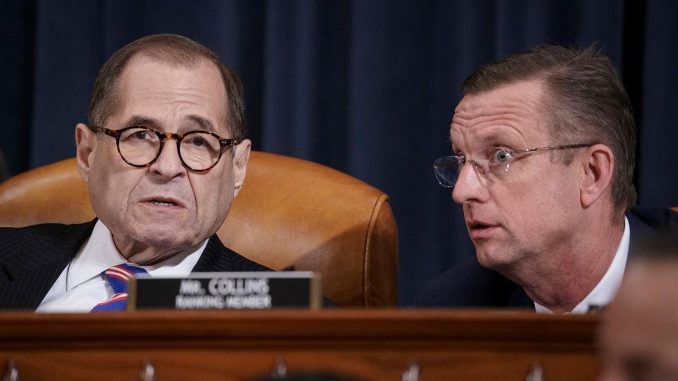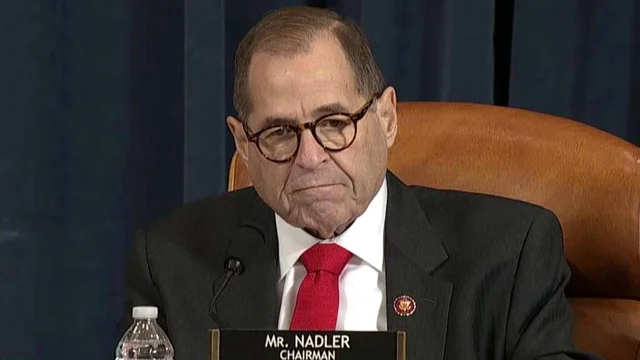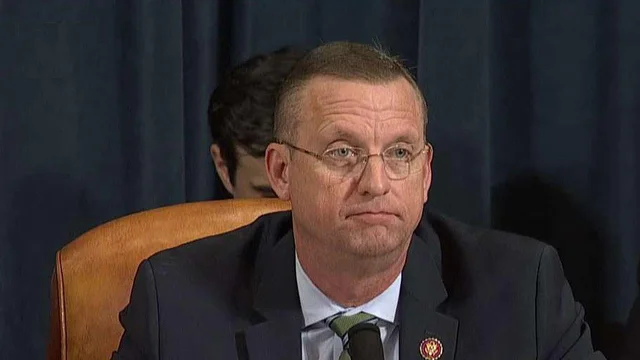
The House Judiciary Committee on Monday kicked off an unruly hearing to receive the impeachment inquiry’s findings, with Democrats arguing President Trump put “himself before his country” while Republicans ramped up their attacks on what they called a “focus group impeachment” driven by a partisan desire to remove the president from office.
The hearing — which consisted of lawyers for both parties essentially making their closing arguments, including by showing video clips of key statements from witnesses, Trump and others — comes as the committee is expected to vote in the coming days on articles of impeachment against Trump.
Tensions immediately flared as the hearing began Monday morning, with a demonstrator being removed by Capitol Police after yelling at Democratic Chairman Jerrold Nadler, D-N.Y. Republican lawmakers also repeatedly sparred with Nadler over their desire for a minority hearing where Republicans could call their own witnesses – something he has not granted.
(snip)

Nadler argued that “every fact” from the anonymous whistleblower who ignited the probe by filing a complaint about Trump’s conversation with the leader of Ukraine over desired investigations this summer has been substantiated by the Democratic-led investigation.
Republicans opened the hearing by saying Democrats have long been motivated by a desire to remove Trump from office even before Trump’s phone call this summer with the president of Ukraine. GOP Rep. Doug Collins, the top Republican on the committee, said Democrats have turned the Judiciary Committee into “a rubber stamp” for House Speaker Nancy Pelosi and Intelligence Committee Democratic Chairman Adam Schiff.
“Where is the impeachable offense?” Collins said, adding, “This may be known as the focus group impeachment.”
Lawmakers are hearing from top Democratic and Republican staffers on the Judiciary and Intelligence Committees – the panels that have heard testimony for the inquiry. The top Republican on the Intelligence Committee, California Rep. Devin Nunes, was spotted seated directly behind the witnesses during Monday’s hearing.
The first witness to testify — Barry Berke, the counsel for Judiciary Committee Democrats — showed various video clips of testimony from prior witnesses, including from Ukraine top diplomat Bill Taylor and former NSC official Dr. Fiona Hill, as well as clips of comments made by Trump.
“The evidence is overwhelming that the president abused his power,” Berke said.

Republicans on the committee repeatedly made procedural objections. Arizona Rep. Andy Biggs, R-Ariz., called for a point of order requesting Nadler schedule a minority day hearing. Nadler said that that is not the purpose of Monday’s hearing and that he was considering Collins’ and Republicans’ request.
The White House on Monday fought back against the hearing, accusing Democrats of having “had their minds made up about impeachment since November 8, 2016” – when Trump was first elected.
Democrats say Trump’s push to have Ukraine investigate rival Joe Biden and issues related to the 2016 election while at the same time withholding U.S. military aid ran counter to U.S. policy and benefited Russia. It’s unclear what articles of impeachment will be sought by Democrats, but it could result in impeachment charges of abuse of power, bribery and obstruction.
As Democrats draft the articles, Pelosi’s challenge will be to go broad enough to appease her liberal flank, which prefers a more robust accounting of Trump’s actions reaching back to Mueller’s findings, while keeping the charges more tailored to Ukraine as centrist lawmakers prefer. Democratic leaders will meet later Monday evening.
The hearing sets off a pivotal week as Democrats march toward a full House vote expected by Christmas. In drafting the articles of impeachment, Pelosi is facing a legal and political challenge of balancing the views of her majority while hitting the constitution’s bar of “treason, bribery or other high crimes and misdemeanors.”
Trump and his allies acknowledge he likely will be impeached in the Democratic-controlled House, but they also expect acquittal next year in the Senate, where Republicans have the majority. Trump’s team is turning attention elsewhere, including Monday’s release of a long-awaited Justice Department report into the 2016 Russia investigation.
A vote to convict in the Senate requires a two-thirds vote of the Senate, where Republicans hold 53 of 100 seats. It is unlikely that any Republican senators would cross party lines and vote to remove Trump from office.
*see full story by Fox News